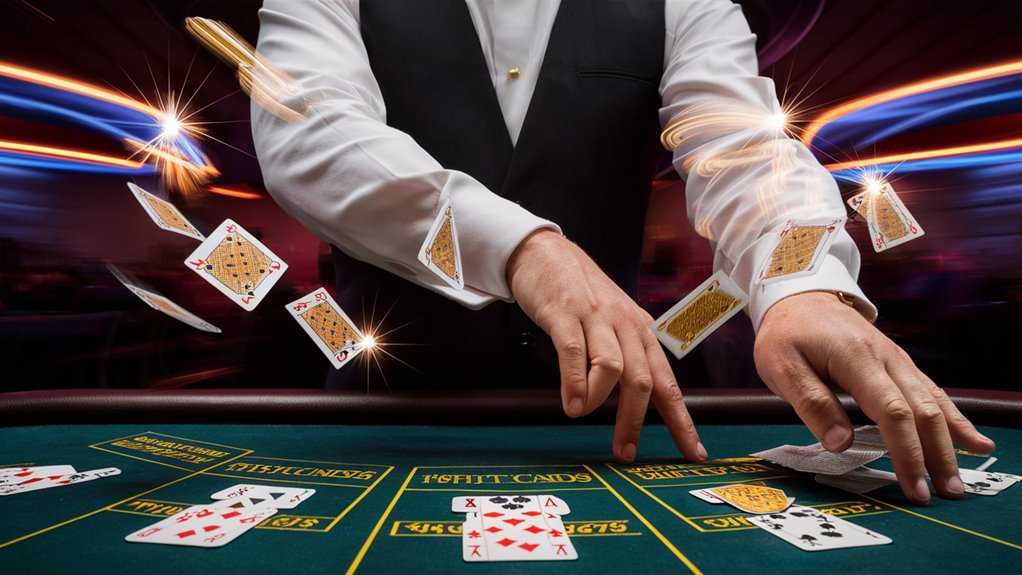Why Gamblers Think They’re Always Right: Ego vs. Reality
Gambler’s grandiosity shows up when winning makes the brain send out strong dopamine signals, creating a fake feeling of having power over games of luck. This messes with their view of reality, making players think too highly of their gambling skills and not see the big part that chance and random events play. 카지노솔루션
How Gambling Makes You Overconfident
The brain’s feel-good system is key in creating gambling delusions. It makes winning moments stand out more in our minds while forgetting the losses. This wrong thought pushes players to bet more, thinking they have some special ability.
Signs That a Gambler Is Being Unrealistic
- Coming up with no-fail betting systems
- Ignoring real odds
- Believing in patterns or gambling myths
- Upping bets when feeling “lucky”
- Seeing losses as just bad luck
The Brain Trap of Fake Skills
When gambling addiction begins, the mix of ego and chance traps the mind. Players with grandiose thoughts often make up reasons to keep gambling, even when they keep losing. Knowing this can teach us a lot about the nature of gambling psychology and how we see risk.
How Winning Streaks Affect Our Minds
The Brain Effects of Winning Again And Again
Winning a lot makes the brain pump out dopamine, making you feel unbeatable. This brain reward system can mess with your clear thinking, making you think you’re better than you are while not seeing the role of luck in your wins.
Understanding the Loop of Wins and Confidence
Winning often builds a complex loop in your thoughts. Each win makes you believe more in your skills, while losses seem like strange one-offs. This memory trick often leads to riskier bets.
Seeing Through the Winning Illusion
Chances and odds show that each game is its own thing, not tied to past games. When on a win streak, it’s key to see these mind tricks to keep balanced. The fake power felt in a win streak can actually make you more likely to lose big later.
Key Mind Games:
- Dopamine boosts
- Memory tricks
- Changing how we see risk
- Remembering wins over losses Emotional Overinvestment in Underground Korean Casinos
- Seeing games as not linked
The mix of brain science and behavior shows how winning a lot changes choices, making it key to understand these tricks to keep control.
How Confidence Messes With Taking Risks
How Believing You Can’t Lose Changes Everything
The Thinking Behind Risk and Confidence
The link between feeling sure and risky moves shows up a lot in gambling. When people win, they feel more skilled than they are, which is risky as their real skills don’t line up.
The Cycle of More Risk
Seeing risk differently happens through a loop: winning makes you more sure and leads to riskier choices. While being sure can help in many areas, in gambling it often hurts more than helps. Gamblers who keep feeling sure even when they lose are open to bigger risks.
How Confidence Changes Choices
The confidence-risk mix changes decision-making. Studies show that too-sure people think they can control random games and ignore the big role of chance. This mindset leads to mistakes where losses seem like flukes while wins make them feel like experts.
Key Risk Parts
- Seeing risk wrong in our minds
- Too much trust in decisions
- Not aligning risk ideas right
- How actions and thoughts circle back
- Patterns in how we see wins and losses
Don’t Get Fooled By Your Wins
What To Watch For In Risky Gambling
Bad thought twists show in big warning signs when gambling gets serious. Tricks of the system appear when people think they have unbeatable game plans. A big red flag is when gamblers don’t see the bad and exaggerate their wins.
Signs in How You Act and Think
Pulling away from others happens as gamblers distance themselves from concerned people for others who enable them. Too big dreams show in big plans for future wins. These people often ignore real odds.
When Gambling Takes Over
Seeing gambling as identity is a warning, especially when money issues pile up. Wrong thinking shows in sayings like “I’m due for a win.” When mixed with anger at help, it’s a sign of needing help for gambling issues.
Things To Really Worry About:
- Thinking the system can’t fail
- Minimizing losses
- Pulling back from others
- Trusting luck over facts
- Seeing oneself only as a gambler
- Getting angry at help
Seeing Through The Trick of Skill vs. Luck
Knowing When It’s Luck or Skill in Gaming
The Mix of Chance and Skill
Pro gamblers know it’s key to see what’s just luck and what’s real skill in games. Many players think wins are all skill and losses just bad luck. This wrong thought changes choices and success rate.
Use Facts To See What’s Real
Watch your game closely
To tell luck from skill, note everything during games. Look at real patterns over time, not just one day. This fact-based approach shows real skills vs. random wins.
What Matters in Games
Different games mean different chances to show skill:
- Blackjack: Where smart moves and counting cards help
- Poker: Where you play both the cards and the people
- Slot Machines: Pure luck with no skill
Real Numbers Matter
Knowing the real odds means seeing control vs. chance. In skill games like poker, short wins come and go but real skill shows over many games. Smart players understand these odds.
How You’re Really Doing
- Long-term win and loss counts
- Risky choices vs. returns
- Comparing decisions vs. outcomes
- Managing game money effectively


